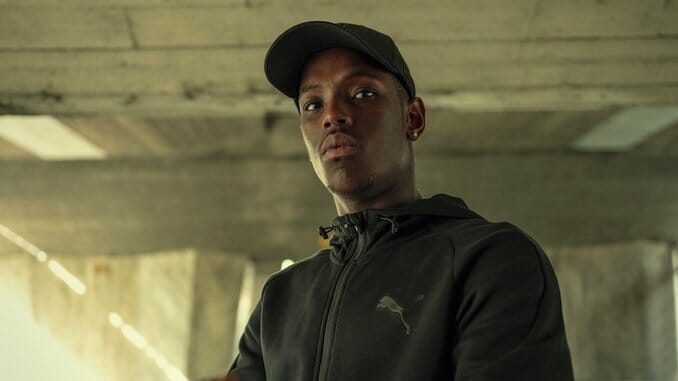Top Boy on Netflix Is Far More than Just the British Wire
Just ask Drake.
Photo Courtesy of Netflix
In the process of considering this essay, I came very close, if only in my head, to describing the Channel 4/Netflix drama Top Boy as “authentic.” I stopped myself only when I remembered that I am, in fact, a middle-class white dude living in North Carolina, and actually have no idea what is authentic or not as it pertains to the estates of east London. (“Estate” being, in this case, the equivalent of the American projects, and not a sprawling manor where the lord and his buddies go on fox hunts). So I’ll refrain from any judgment on that front, while holding on to this: it feels authentic.
It feels more than authentic, actually, in the way it places you in an unknown world with no apology and very little preamble, and immerses you in an unfamiliar but irresistible dialect coupled with stories that are all the more riveting for the way information and context is released in small drips to slowly fill out the universe. Compared to something like the fourth season of Fargo, which is obsessed with history and backstory to the point that it oppresses the narrative, this is a subtle show, in which the social milieu is uncovered gradually alongside the narrative to render the heartbreak all the more intense.
The story behind the show is a strange one. It was written and created by Ronan Bennett, who in his Northern Irish youth was accused of robbery, murder, and bombing, and spent time in the infamous Long Kesh prison with other suspected IRA members. From there, he moved into English academia, and was eventually hired to work for Labour politican Jeremy Corbyn. He became an author and screenwriter, and despite the brilliance of the first two series of Top Boy, which came out in 2011 and 2013, Channel 4 opted to cancel the show after just eight episodes. That seemed to be the end of the story, and it was—for six years. In the interval, the rapper Drake watched the first two seasons while on tour, and loved it so much that he led the charge to pitch a third season to Netflix. Getting the greenlight for the original series had been a long and arduous process, but with Drake on board, Netflix was sold in under an hour. And in 2019, at long last, the third season—ten episodes, this time—aired on the platform, and the first two seasons, under the name Top Boy: Summerhouse were re-added. Today, all 18 episodes can be found on Netflix, and a fourth season is already in the works.
The most common comparison you’ll see is to HBO’s iconic crime drama The Wire, and there’s something to that, in the sense that it’s a story of a largely poor, black population and the inner-city drug trade that scars their communities. Unlike The Wire, the cops here are peripheral, and the focus is almost entirely on the people of “Summerhouse,” the fictional estate where most of the action plays out. Top Boy tackles social ills like poverty, mental health, drugs, and capitalism just as effectively as its American predecessor, but it does so in a slightly different way, with slow revelations through character arcs rather than the (sorry) Dickensian sweep of David Simon’s show, which relied a bit more on monologue-adjacent explanations. Here, the story is at the forefront always, and you’re asked as a viewer to participate as seriously as the writers; there’s no Lester Freamon or Jimmy McNulty to explain how things work.
The first two series, which I’ll write about vaguely to avoid spoilers, centers around Dushane (Ashley Walters) and Sully (Kane Robinson), two Summerhouse natives who start off with a little power and want much more. Their shared ambition is to rise within the amorphous hierarchy and become the “top boy” of the London drug trade. Their foil is Ra’Nell, a young boy whose mother suffers from severe depression and who harbors a dream of playing soccer at a professional level. Ra’Nell has an uncommonly stiff backbone as he resists getting sucked into the crime that pervades his life, but the lesson of this show is that there’s no escape—not for him, his sympathetic friend Gem, or even for someone like Dushane whose success leads him to dream of distancing himself from the streets that reared him. (The end of Season 2, especially, highlights the speed at which things can fall apart even for the most successful criminal.)
The environment has an ironclad hold on them, and through their eyes we see how a mutated, criminal version of capitalism hangs over them like a dark cloud, even while the forces of legal capitalism, like gentrification, strive to cast them deeper into economic misery while lining the pockets of rapacious outsiders. The tragedy of their lives is that it’s not impossible to imagine something different; it’s only impossible to achieve it.